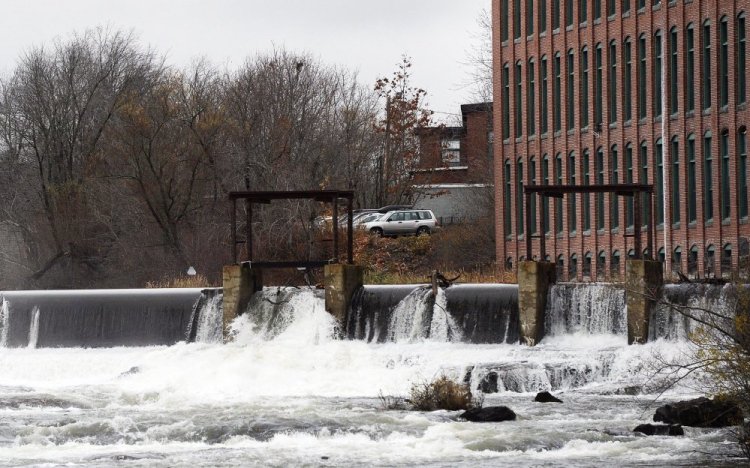Staff members have advised the Maine Board of Environmental Protection to reject two appeals meant to derail a proposed dam removal and fish passage agreement for the Presumpscot River.
As part of a settlement announced in November, Sappi North America agreed to remove two spillways, or dam headwalls, at Upper Saccarappa Falls in Westbrook, and to install a fish passage system around Lower Saccarappa Falls. The company also agreed to either remove or provide fish passage around dams at Little Falls and Mallison Falls once a certain number of fish pass Saccarappa Falls.
The settlement was negotiated by the Friends of the Presumpscot River, the Conservation Law Foundation and other groups. Supporters say it will help restore one of Maine’s oldest industrialized rivers.
However, two conservation groups that were not part of the deal have argued it doesn’t go far enough. The Friends of Sebago Lake and the Friends of Merrymeeting Bay have said it will delay fish passage at the Dundee and Gambo dams – both located in the upper half of the 25-mile-long river – until at least 2053 and possibly later.
The agreement will eventually need both state and federal approval. In the meantime, the state has granted Sappi a one-year extension – until May 2019 – to provide fish passage around Saccarappa Dam. As part of their efforts to fight the settlement, the Friends of Sebago Lake and the Friends of Merrymeeting Bay have both appealed the extension. The staff of the Maine Department of Environmental Protection has recommended that the board reject those appeals, which are scheduled for consideration Thursday during a meeting that begins at 9 a.m. at the Augusta Civic Center.
“We don’t oppose what they want to do in Westbrook at all,” said Roger Wheeler of the Friends of Sebago Lake. “We think that’s great, but not at the cost of taking away from what should happen (at the Dundee and Gambo dams).” Parties to the agreement include Sappi, Friends of the Presumpscot River, the Conservation Law Foundation, the U.S. Fish and Wildlife Service, the Maine Department of Marine Resources and the city of Westbrook.
Sean Mahoney of the Conservation Law Foundation said the extension was needed to make sure the proposal will be effective. He noted that the groups involved in the settlement have often been in conflict over the river’s future, but this agreement has their collective support.
“I think that fact in and of itself is reflective of the fact that we believe the settlement agreement is good for the river,” Mahoney said.
He said he hopes the board follows the staff’s recommendation to allow the extension to stand.
“We’re now at a point where those parties that had been in opposition to each other for decades have now come to the outlines of an agreement to remove the dam at Saccarappa and to ensure that fish are going to be able to get up and over the natural falls,” he said. “In order to do that, we needed more time to gather data.”
If the appeals are rejected, Mahoney said the next step would be for the parties to submit the settlement agreement for federal and state review. If the appeals are granted, he predicted the fish passage would be jeopardized.
“I think it would be very damaging,” Mahoney said.
If the appeals are rejected, Wheeler said Friends of Sebago Lake would pursue the case in Superior Court. If they are unsuccessful in court, they plan to challenge the settlement agreement when it is filed with the state.
Wheeler hopes fish passage at the other dams will eventually repopulate the upper river and the lake with anadromous fish – those that spend most of their lives in the sea and return to fresh water to spawn.
“I wish the people of Maine could understand what they’re missing by not having the anadromous fish come up their rivers,” he said. “We just feel like it’s our obligation to do this for the children of Maine, the future of Maine.”
Megan Doyle can be contacted at 791-6327 or at:
mdoyle@pressherald.com
Twitter: megan_e_doyle
Send questions/comments to the editors.




Comments are no longer available on this story